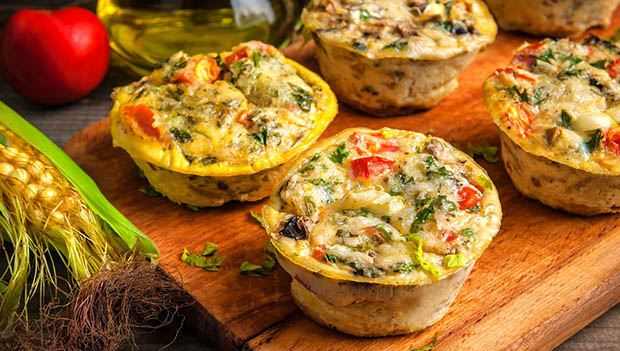
If you're kicking off the new year with a goal of cleaning up your diet, you might be wondering how much it will cost. While it may require you to think outside the box, eating healthily doesn't mean you'll blow your monthly food budget all in one week. To help you get started on the right foot, we asked registered dietician Michelle Shapiro to share her tips and tricks for healthy eats on a budget.
Protein
Including adequate amounts of daily protein is critical for your health. That's why Shapiro says it's important to always have quick and cheap proteins available. "Having no protein available is one reason why most people end up ordering out in a pinch," she says. These options are lower-priced and ideal for keeping on hand:- Pasture-raised hard-boiled eggs
- Egg muffins (beat eggs and mix with vegetables, then bake in a muffin tin)
- Wild caught canned tuna fish or canned salmon
- Tempeh (a fermented source of soy protein)
- Unsweetened Greek yogurt
- Frozen turkey burgers
- Organic, carved deli meat
Carbohydrates
"Choosing starchy vegetables and batch cooking is an easy way to get high fiber, vitamin-packed carbohydrates into your diet," Shapiro says. For example, instead of buying pre-cut squash and potatoes, which can be more expensive, purchase whole squash and pumpkins and cut them in half. "Starchy vegetables can be prepared on weekends and served for several days during the week," she adds. These are some other examples of reasonably priced carbs to have on hand:- Canned beans (rinse before eating)
- Rice and quinoa
- Steel cut oatmeal
- Plantains
- Fruits (see section below)
Fats
Choosing foods that are high in monounsaturated fats and omega-3 fats are essential to overall health. But Shapiro says major sources of omega-3 fatty acids come from fatty fish and walnuts, which are pricier compared to other options. The good news is there are more affordable ways to consume these vital fats. Here, Shapiro shares tips for including healthy fats on a budget.
Omega-3 fats. Seeds are often less expensive than nuts. Instead of purchasing pricey walnuts, Shapiro says to incorporate more chia seeds and flax seeds into similar recipes. "Pumpkin seeds are another great choice, although their omega-3 content is less than chia or flax," she adds.
Healthy saturated fats. When purchasing saturated fats like coconut oil and (grass-fed) butter, Shapiro says to purchase in larger quantities, which brings the unit price down. "Instead of purchasing individually wrapped coconut yogurts, purchase the whole container," she says. The same can be said for coconut oil; the larger the container, often the lower the unit price.
Nut-butters. For those trying to avoid peanut butter in a paleo-style diet, almond butter and cashew butter are excellent alternatives, Shapiro says. But they can be more than triple the price. She suggests sunflower butter, which is an excellent alternative and the same price as most peanut butter.
Mono-unsaturated fats. When purchasing avocados from stores like Trader Joes that charge per item instead of by item weight, Shapiro says always get the largest product. "Find the largest avocados possible and preserve them after each serving with a squeeze of lemon juice to prevent browning," she adds.
Fruits and Vegetables
Buying organic produce can add up quickly. But you don't have to stick with organic for all of your fruits and vegetables. Instead of purchasing every single fruit and vegetable organic, Shapiro says to buy conventional fruits and vegetables from the "clean 15" list. This list has produce that's least likely to contain pesticide residue. Another tip Shapiro says is to buy from the frozen aisle. Frozen fruit is perfect for smoothies and frozen veggies make a great side for kid meals.
READ THIS NEXT: The Healthiest Things You Can Buy at the Grocery Store


